ISLAMABAD: The prices of petroleum products are estimated to decrease substantially for the month of March owing to about 20 per cent fall in oil prices in the international market.
Three different proposals are currently in the field for price cut as the Dubai Crude rate came down from $62 per barrel on Jan 31 to $50 a barrel on Friday, down 19.35pc. On the other hand, the benchmark International Brent price reduced from $60 a barrel to $51 a barrel, down 18.33pc.
An official told Dawn that based on existing tax rates, the Oil & Gas Regulatory Authority (Ogra) had calculated about Rs15 per litre reduction in the price of high speed diesel (HSD) and petrol, respectively.
In contrast, he said the Ministry of Finance and Federal Board of Revenue (FBR) were trying their best to pass on about half of the price reduction calculated by Ogra to consumers and retain the remaining amount as windfall by increasing tax rates.
Finance ministry, FBR want hike in taxes on diesel, petrol to cover revenue losses
He said the finance ministry wanted to make up for revenue losses arising out of lower import parity price for crude and petroleum products and the overall revenue shortfall it had faced in the first eight months of the current fiscal year.
With higher tax rates, another working put the price cut in HSD and petrol by Rs7.23 and Rs5.79 per litre, respectively. On the other hand, on the directives of Prime Minister Imran Khan, the PM’s Delivery Unit (PMDU) had proposed scaling down the HSD price from Rs127 to Rs100 per litre, a reduction of Rs27 per litre.
It also recommended the petrol price for March at Rs100 per litre, down by about Rs15 a litre.
The official said the prime minister had been told that reduction in HSD price would go a long way in bringing down the rate of inflation because it was the primary source of transportation and agriculture in the country.
Also, the price of diesel is lower than petrol in many countries because of its inflationary impact.
The official, however, explained that a drastic restructuring in pricing structure and amendment to rules were required to comply with the PM’s directive and hence would require some time to deliver. Because of these converging views, the Prime Minister Office had ordered Ogra and the ministry of energy to keep the proposed rates strictly confidential and had called another round of consultations on Saturday (today) to reach a final decision.
Based on marathon discussions and deliberations on the subject, the official said the prices of HSD and petrol would be reduced by at least Rs10-11per litre. At present, the ex-depot rate of HSD stands at Rs127.26 per litre and that of petrol Rs116.60 per litre.
The government already increased the general sales tax (GST) on all petroleum products to standard rate of 17pc across the board to generate additional revenues.
Until January last year, the government was charging 0.5pc GST on light diesel oil (LDO), 2pc on kerosene, 8pc on petrol and 13pc on HSD.
Besides the 17pc GST, the government had more than doubled the rate of petroleum levy on HSD in recent months to Rs18 per litre instead of Rs8 per litre. The levy on petrol had also been increased by 50pc to Rs15 per litre instead of Rs10 per litre. The petroleum levy on kerosene oil and LDO remained unchanged at Rs6 and Rs3 per litre, respectively.
Over the last many months, the government had increased petroleum levy rates to partially recoup a major revenue shortfall faced by the FBR. The levy remains in the federal kitty unlike GST that goes to the divisible pool taxes and thus about 57pc cent share is grabbed by the provinces.
The petrol and HSD are two major products that generate most of revenue for the government because of their massive and yet growing consumption in the country.
Total HSD sales are touching 700,000 tonnes per month against monthly consumption of around 600,000 tonnes of petrol. The sales of kerosene oil and LDO are generally less than 10,000 tonnes per month.
Published in Dawn, February 29th, 2020














































